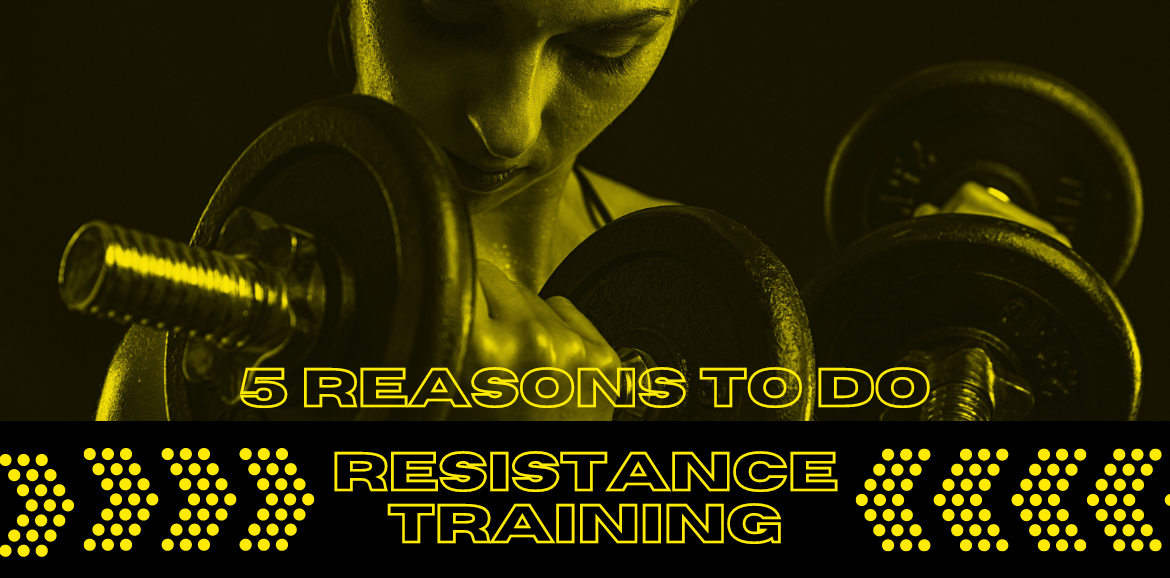Muscle & Bone Strength
Most people know that when you strength train, you gain muscle. Everyone loses muscle mass as we age, a process called sarcopenia. Sarcopenia is prevalent in post-menopausal women and in older men. Fighting off sarcopenia isn’t the only reason to life weight though. In addition to losing muscle mass as we age, we also lose bone mass called osteopenia and experience bone loss, which is osteoporosis. These conditions occur at a faster rate with inactivity. This bone-thinning process leads to brittle bones and is the major reason that old people break bones, particularly hips, in old age. Regular resistance training can slow or even stop the progression of these conditions.

Mood Improvement
We produce increased endorphins, dopamine, and serotonin levels when we work out. These three chemicals all work in different ways to boost mood and are increased when you exercise. Endorphins are the body’s natural pain reliever. Dopamine is in charge of the body’s reward or pleasure centers. Serotonin is a neurotransmitter that acts as a hormone regulating mood, among other jobs it has. Endorphins and dopamine work hand-in-hand during exercise. Let’s say you are lifting weights, and your muscles get achy. At that point, endorphins kick in to relieve that pain. Then, dopamine is released, creating an “exercise high” and telling the body, “Let’s do this activity over and over again!” During exercise, serotonin works independently of endorphins and dopamine. Serotonin’s role in mood improvement is in regulating focus, emotional stability, and calmness. Serotonin calms your stress response. This is why exercise is a great stress reliever.

Increases Energy Levels
Exercise studies have shown that moderate exercise can increase energy levels even in those with chronic fatigue. Why would resistance training give you more energy? Doesn’t exercise make you more tired? First, exercise delivers oxygen and nutrients to your body, which helps out your whole cardiovascular system. When your heart and lungs are working efficiently, you have more energy. Next, working out produces more mitochondria in your cells. Mitochondria are the power plant of your cells. More mitochondria equal more energy supply. Lastly, muscles raise your metabolism. The higher your metabolism, the more energy you have.

Decreased Risk of Chronic Diseases
Studies suggest that chronic diseases such as heart disease, stroke, metabolic syndrome, high blood pressure, Type 2 diabetes, and arthritis can be prevented or managed better with a regular exercise plan. By participating in resistance training, muscles get stronger and increase balance and flexibility. Lifting weights strengthen joints, which can lessen arthritis pain and balance issues, reducing fall risk. Many age-related chronic diseases can be managed better when a person is not dealing with mobility issues and inactivity.

Can Help with Sleep
Two recent clinical studies found that resistance training may be more important than cardiovascular exercise in helping sleep. This first study from 2020 found that strength training creates a molecule called adenosine, which tends to cause drowsiness, and exercise tends to help reduce symptoms of depression and anxiety (hello serotonin), which can eliminate problems of chronic insomnia, both with falling and staying asleep. The second study was completed in 2022, and initial findings suggest that fixing sleep problems with consistent resistance training can also help treat chronic cardiovascular diseases. The study claims poor quality sleep increases risks for high blood pressure, elevated cholesterol, and atherosclerosis. The study also maintains that not getting enough sleep is linked to weight gain, diabetes, and inflammation.










